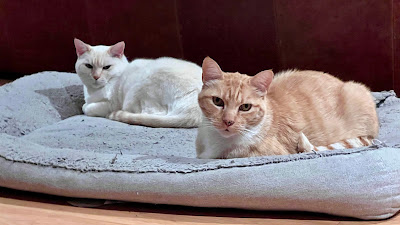Three years ago, many Canrights converged on a 100-some-acre farm in Ontario, Canada, up near Meaford on the shores of Georgian Bay, Lake Huron. Family reunion!
Last week, we did it again—a somewhat different assortment of people, but just as invigorating. Our superb hosts were Jess and John Zufferli—Jess being my husband's eldest brother's daughter (our niece), John her awesomely game husband. Hats off to the both of them for a wonderful time.
We came from all over: two sets of us from central coast California; two sets from Washington state (Edmonds and Wenatchee); North Carolina; Atlanta; and Oslo, as in Norway (we are far-flung). Twenty-two of us in all, ranging in age from 13 to 78. Three generations.
 |
| The three remaining sibs: David (the baby), Geoff, and Patty (the new eldest) |
There should have been a couple from Cleveland, Ohio, but Jess's dad—David's big brother (formerly the eldest)—died in March, and his wife, Virge, wasn't up for the trip. We toasted them in their absence. There should also have been one or two from Texas—Jess's brother, David, and his wife, Jeannie—but they were traveled out from a recent trip to Japan. We missed them.
I posted some photos on FB, which I link to here (click on the highlighted bits).
Day 1 (Thursday): Arrival! We got to the farm around noon, after a red-eye flight, and had a delicious few hours on our own with Jess and John (and sweet Sadie the labradoodle). Also, a nap. Others started arriving in the evening, though the Washington contingent kept getting grounded in Cleveland—ironically enough. They finally reached us the next day.
 |
| The view from our window in the 165-year-old farm house |
Day 2 (Friday): I took a morning walk on the loop through the fields and woods, which is where these pictures are from. Much of the day was spent hanging out, swimming, catching up, and waiting for the Cleveland folks to arrive. And when they did, David, Patty and I went for another loop walk!
Day 3 (Saturday): Today we all (but one) went on a hike through some lovely (if warm) woods, then for pizza, beer, and wine at Coffin Ridge Winery. After that we went various ways. David and I took the opportunity to do a little geocaching. We lost Kolya, Nicole, and Enon, who took off for Toronto to look around before heading in various directions.
And later on that evening, we played outdoors under a beautiful sky. Frisbee! Sparklers!
Day 4 (Sunday): Today’s hike took us through the woods to Inglis Falls, followed by a picnic and—for some (a couple of the Norwegians)—a visit to Walmart (not documented) while others ended the day with a visit to the lakeshore (Lake Huron’s Georgian Bay) (ditto). Beautiful day.
 |
| Yes, there was geocaching! |
Day 5 (Monday): Departure day, beginning at 3 a.m. for the other central California contingent. The hubbub of connection and hugs, over and over, was beautiful. Our 7 p.m. flight was on time, and we were home to our Milo at just after midnight.
What a great few days. I'm so glad to be part of this family.







_male_breeding_plumage_yellow.jpg)








